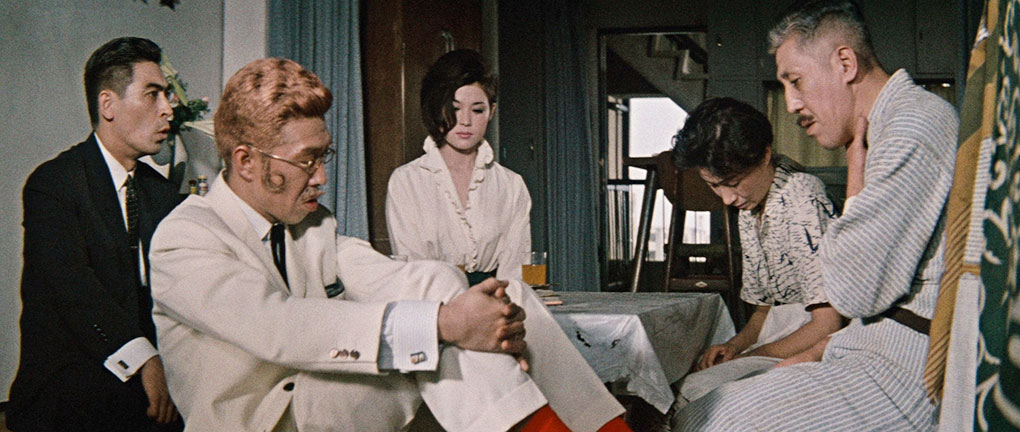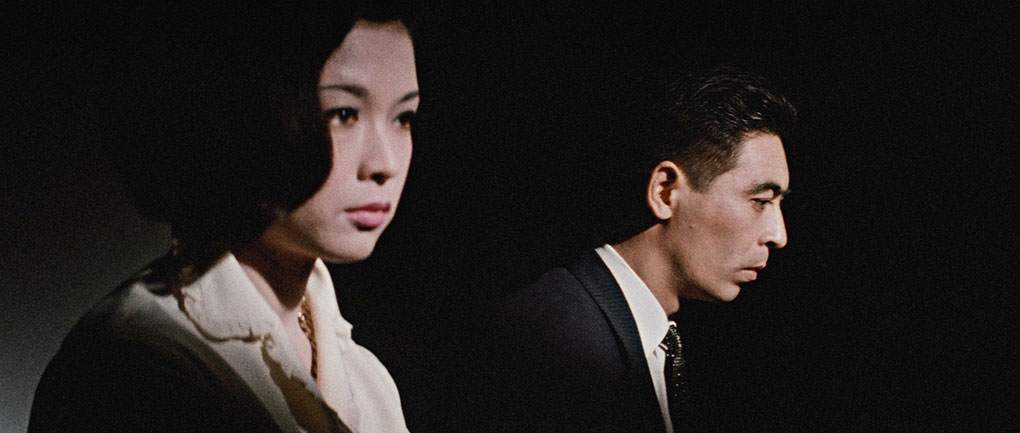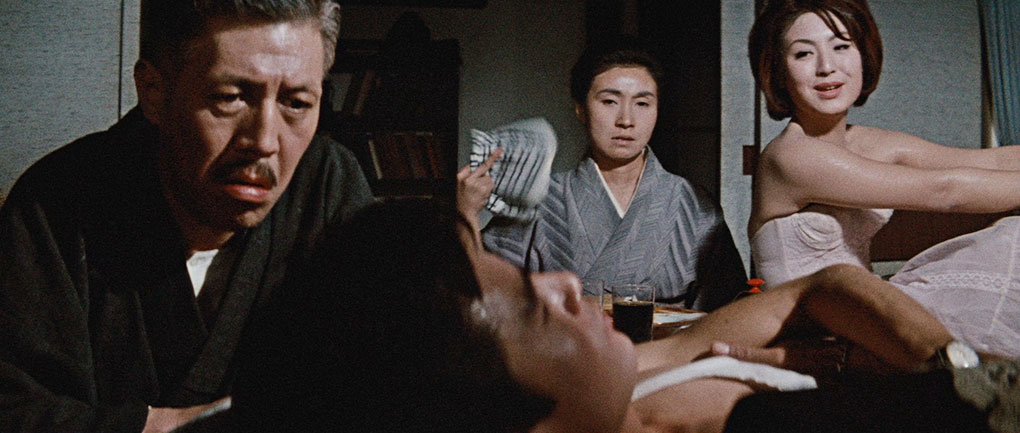|
Elegant Beast (Shitoyakana kedamono, aka The Graceful Brute) is about dishonesty, corruption, deceit and double crossing. The characters are embedded and comfortable within this immoral world like pigs in mud. In a series of double crosses we see many of these characters get what’s coming to them while some get to ride off into the sunset victorious.
The parents are in traditional dress and appear modest but it soon becomes apparent that lies and deception is their game; the son and daughter have been taught to pursue a life of scheming and fraud and they all live together in relative familial harmony, each playing a specific role. They live and breathe thinking how to exploit others, and the film only gives us hints at what may be the underlying motivations. The father refers to their life of abject poverty which so many would have experienced in post-war Japan, but this is not a heroic tale of triumph over adversity but of a father who is feckless and irresponsible and who uses his children to do the dirty work.

There is a light tone to the film that keeps it from being a grim drama and instead gives us an exhilarating and blackly comedic 24 hours in the life of these modern day bandits. When the tables turn and it is revealed that there is someone even more adept at moral gymnastics than they are, it proves amusing. The script by Kaneto Shindō (Kuraneko, Onibaba, The Naked Island) is original, entertaining and full of subtlety. Ultimately the film can be seen as a sharp portrayal of a society desperately doing what it can to get what it can.
As with so many Japanese films I find myself in awe of the acting – every part is brilliantly played and the lead players excel. The parents could be in an Ozu/Naruse film, and the children represent the New Wave generation of Japan. Actress Ayako Wakao gives a tour-de-force performance as accountant Yukie Mitani.
Almost every scene takes place within the family apartment, and I discovered afterwards that every shot is from a different camera set-up – while watching the film I was aware of the brilliant use of camera angles and it creates an original atmosphere in the film. There are moments when time seems to slow down through very effective camerawork and editing, and where symbolic dream-like states are portrayed. There is traditional music at the opening credits that, in my limited knowledge, felt like Japanese theatre music (edit – confirmed in the booklet as Noh music). The apartment becomes like a theatre stage where partitions divide up the action and the camera re-inforces this by often giving us simultaneous views of different rooms. There is a sense of eavesdropping, scheming and deception that is genius.
The film received a 4k restoration by the Kodokawa Organisation and Radiance carried out some additional color grading for the 1080p transfer on this Blu-ray release. Framed in its original aspect ratio of 2.35:1, there is a subdued look and a slightly earthy hue to the colour that is very likely be true to the source, and detail is generally well defined. The print is clean and grain is evident but not obtrusive. This is a very good presentation of the film.

The soundtrack is mono LPCM 2.0 and the dialogue is clear. I only noticed the film score at the opening and end of the film.
The English subtitles are activated by default but can be switched off.
Toshiaki Sato (16:34)
This is a very good overview by film critic Toshiaki Sato of the career of director Kawashima and a look at the key themes and making of this film. Sato discusses the fast pace (created by the actors and editing) of the director's films.
Toshiaki Toyoda (14:21)
The director of Blue Spring and Hanging Garden gives a very personal appreciation of the director, whom he met and greatly admired.
The Age of Danchi (11:38)
A video essay by film critic and historian Tom Mes that looks at post-war Japan through the lens of the newly designed Danchi apartments. It is a really original supplement.
Trailer (2:16)
The original Japanese trailer gives a flavour of the film's tone and characters without revealing much about the story.
I noted that all of the above supplements were Radiance productions and those responsible deserve recognition for creating such interesting content.

Booklet (only included in the first pressing)
The booklet features an excellent essay by Midori Suiren that includes a particular emphasis on the female roles and actresses, and a second rather interersting essay by Yasunari Takahashi that focuses on the use of space.
This simple story set in a Tōkyō apartment plays as a commentary by Kaneto Shindo on contemporary Japanese society. Director Kawashima brilliantly stages and shoots the film in a highly original and entertaining way, and the supplements on this disc do a good job at highlighting the themes and insights. Kawashima made 51 films in a period of just 19 years, and Elegant Beast is one of his last. It demonstrates a mastery of the craft of filmmaking.
This was an excellent choice for release by Radiance Films, which is building up a superb and diverse catalogue. I also want to reference the Blu-ray menu layout which is very attractive. An essential release in my opinion – original, undiscovered and insightful.
|